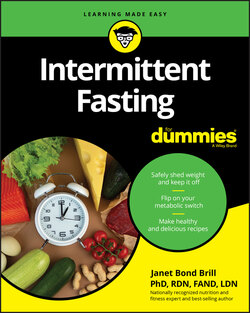Читать книгу Intermittent Fasting For Dummies - Janet Bond Brill - Страница 32
Making friends with the scale
ОглавлениеScientists concur that keeping tabs on your progress by weighing yourself often (and recording the weight) is one of the best tools for helping you achieve your weight-loss goals. In fact, stepping on the scale is the best way to assess whether your intermittent fasting program is working for you. If you don’t see a drop in weight over time, then you need to reassess your program and tweak your plan. If you’re trying to hit a specific number or weight range, weighing yourself is the simplest and most accurate means of determining your starting point and whether you’ve reached your goal.
You may hate the idea of the scale, but frequent self-weighing is not only beneficial for losing weight, but it also helps prevent weight gain associated with aging as well as stopping weight regain after loss. Be brave, step on that scale!
Keep the following pointers in mind as you weigh yourself to ensure your results are as accurate as possible:
Remember not all scales are created equally. Different scales can yield different results at different times of day. Therefore, experts recommend routinely using the same scale to highlight your progress.
Weigh in the morning. If you weigh yourself at night, especially after you’ve eaten, you’re going to weigh more than you truly do. Weigh yourself first thing in the morning, unclothed, and definitely not after an exercise bout.
Wear your birthday suit. Clothes can add up to two pounds on the scale that don’t account for your actual body weight. Weigh yourself unclothed.
Don’t weigh every day. You won’t see major changes from day to day and checking the scale that frequently can do more harm than good by affecting your mood and motivation. Twice a week is ideal.
You don’t take a holistic approach. The number on the scale shouldn’t be the only measure of your success. Just because the numbers on the scale aren’t moving, or aren’t moving fast enough for you, doesn’t mean your body isn’t changing in a positive direction. You can still be losing fat, perhaps gaining a tad of muscle, and looking at your newfound energy boost as positive markers that your healthy lifestyle is working.
When you’re trying to lose weight, you can easily let the number on the scale ruin your day. Don’t overstress it. You may have eaten too much water- retaining sodium, you may be adding muscle, or you may have overeaten. Weight fluctuates naturally, and because weight on a scale isn’t always reflective of other positive changes that are happening in your body, I suggest you use other methods of assessment tools that I outline in the following sections.
Weighing yourself is not mandatory when following an intermittent fasting program. You’re weighing yourself to obtain data, not to judge yourself. However, if the scale isn’t an assessment tool you want to use, then ditch it!
